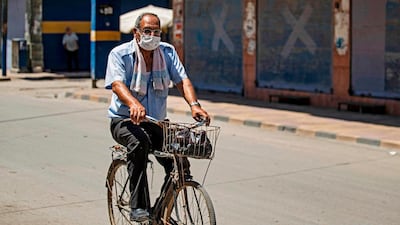Since Tuesday, the region’s attention has shifted away from the coronavirus pandemic to the devastating blasts at the Beirut port, which killed more than 150 people and left hundreds of thousands homeless. Beirut’s most recent tragedy, however, will almost certainly lead to an increase in the already soaring number of Covid-19 cases in the country. Just three days after the explosions, Lebanon has reported a record 279 infections.
Thousands of those injured rushed to Beirut’s hospitals seeking treatment after the blasts, with medical facilities already near full capacity due to a spike in the number of cases that preceded the explosion. In the days since, people from all over Lebanon have rushed to Beirut to help clean up the capital and provide aid to those who need it most. This moving show of solidarity has, however, led to crowds gathering in some areas to provide relief, having to give up physical distancing precautions, even as hospitals have been damaged.
In neighbouring Syria, meanwhile, coronavirus is believed to be widely spreading among the population. Roughly 1,000 cases have been declared in the country, but the real number is believed to be much higher. A recent study by Syria In Context, a weekly newsletter, estimates that there are about 85,000 suspected cases in Damascus alone. The authors have called their estimate “conservative”, with the virus also believed to be widespread in Latakia, Aleppo, Deir Ezzor and Sweida. A lack of personal protective equipment and testing kits across Syria has made it difficult to assess the true scale of the outbreak. The regime has also failed to take any meaningful action to protect its citizens. In a video recently shared by Hosein Mortada, a pro-government journalist, on the occasion of Army Day, he is seen at what he says is a Syrian Arab Army air base, with his mask pushed below his chin. Officers are seen in the background, with no face coverings and little respect for physical distancing measures.
The rebel-held enclave of Idlib is completely cut off from the rest of the country, with little access to testing kits. Its healthcare infrastructure has been ravaged by years of uninterrupted shelling. Covid-19 is not only affecting a population battered by nearly a decade of conflict, it is also being exported to neighbouring countries. Syria has porous borders with Lebanon, Jordan, Iraq and Turkey. Three weeks ago, Jordan announced that it had 46 new cases, with 44 of those infected having arrived from Syria.
Syria’s crumbling medical infrastructure has been further devastated by conflict. The nation is left woefully unprepared to deal with the pandemic, and the regime has shown scant regard for the lives of the people it is supposed to protect. After having fallen victim to a terrible blast, Lebanon is also in need of help to stop the pandemic from ravaging the crisis-hit nation. The international community must provide coronavirus aid to the nations that need it most, in addition to humanitarian relief.
Since Thursday, the UAE has sent tens of millions of dirhams worth of aid to Lebanon, including 12 tonnes of protective equipment to safeguard against Covid-19. Medical aid can save lives and help to halt the spread of the pandemic, but humanitarian relief must be delivered to the people through trusted charities in order to prevent it from falling into the hands of corrupt governments that have only wrought pain upon their people.


